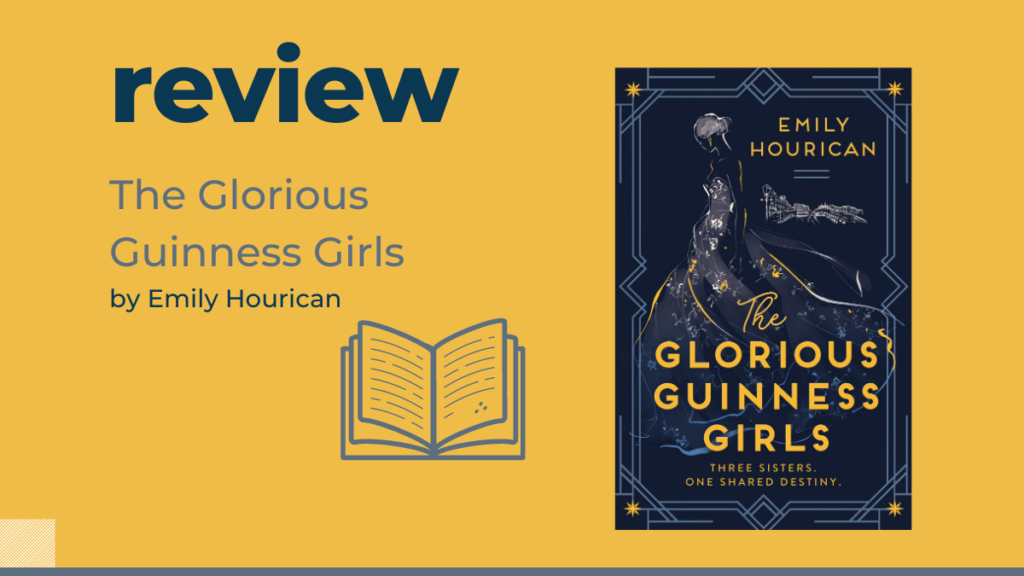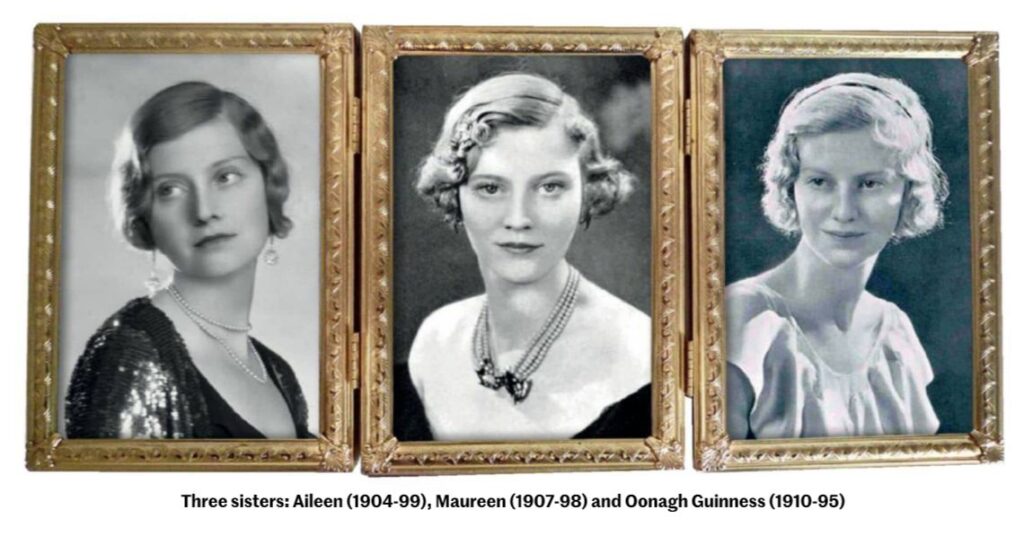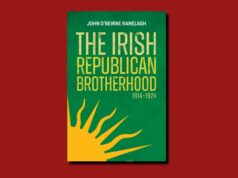
The Glorious Guinness Girls
by Emily Hourican | Hachette Books Ireland | pb £13.99 | 9781529352887
Review by Fiona Murphy
It would be easy to look at the cover and opening chapter of The Glorious Guinness Girls and conclude that it is another Downton Abbey copycat in its romantic, saintly and sympathetic representations of the stubbornly clueless, post-war upper classes. The dresses, the balls for coming out to London society, the Upstairs Downstairs-style relationships with staff all lends itself to what could be another book glorifying an enigmatic and wealthy family straight out of the 1920s society pages.

But Emily Hourican creates a much more nuanced and complex portrait of not only the Guinness family and their associates, but of the unstable, ever-changing world they live in. From early on, this novel is not really about the Guinness girls, although they are an interesting social and cultural frame for this story. Fliss, Hourican’s fictional protagonist provides us with a liminal figure, who is neither the upper-class Guinnesses nor their lower-class servants. She hovers somewhere in between and therefore sees all, from the debaucherously scandalous parties the girls attend to Fliss’s brother Hughie’s increasingly dangerous fascination with the Irish Free State. Her in-between status only emphasises the changes of class mobility, political upheaval and discontent in Ireland and beyond. She is our reporter on the real centre of the story—pre- and post-civil war Ireland, and glitteringly unaffected England.
The Guinness family gives us insight into the Anglo-Irish and all they represent as an ‘in-between’ class that is so controversial in this time of immense change, socially, politically and culturally. The ideal ‘Big House’ is not all it seems, fracturing from within as the rumblings of this new, violent world shakes the teacups at afternoon tea. It is Hughie, educated, anti-treaty and increasingly disillusioned, that brings the complexities of the treaty to the girls’ attention. His disappearance during one of the many conflicts leaves both Fliss and the family devastated, and tensions rise that bit more between them and the progressing cultural landscape.
While this fictional account of real people and events focuses on national and international politics, it is Hourican’s meditations on the politics of class and gender that really shine, showing the real-life gradations of privilege available, even to the upper levels of society at the time.
They had different rules, less visible, just as strict, but in the beginning, all I saw was the immense indulgence they were granted … I suppose I took that for freedom at first …
As much privilege as the Guinness women have, Ernest Guinness is the gyre on which they wind, the girls forming their own warm and close unit until ‘men, disrupted the balance of our lives in the same way that Ernest did, bringing to all of us, that biting need to be first that meant we were not careful with one another’. Hourican’s treatment of these issues are reminiscent of Jane Austen—but more overtly political. That same subtle critique is there, in reading between the lines, the same gender and class examinations are made through entertaining and engaging characters and storylines, told through a specifically female and liminal lens.
This changing world eventually infiltrates the household, their sheltered and dreamy childhood—punctuated with bursts of violent Irish history—giving way to adulthood. The novel picks up pace here at a driving, sparkling, runaway speed, hurtling towards something dangerous and electric. The characters surrounding the girls become more eclectic and an almost hysterical gaiety sweeps the nation, in the all-encompassing and all-consuming lifestyle of the hedonistic ’20s. Hard and glittering like a glass about to shatter or a lightbulb about to blow, this lifestyle breaks apart the close sisterly and familial bonds, breaking tradition along with it. The spectre of Hughie lingers throughout their lives, a constant reminder of what is happening beyond the gates of the town house and although the changing times are seen through the girls’ attitudes, reflecting the loosening morals of the day, it is increasingly difficult to ignore the urgent strains of rising unemployment, the London strikes and the crashing stock market happening in the novel’s background.

Hourican writes that ‘from the start I’ve been fascinated by all three of them, and the world they inhabited’, and that much is certainly true, and can be seen in the lovingly constructed details of the Guinness girls, visceral and illustrious. But what truly stood out for me in this novel was the constant construction of Felicity’s character and her place in these glorious creature’s worlds. For all that Hourican is fascinated with the Guinnesses, her identification with Felicity rings out from the pages, as observant, watchful and eager to understand as the journalist herself. Which is perhaps why I felt Fliss deserved a better ending, than still half-in half-out of the Guinness’s service, almost 50 years on. But then, as Hourican says, ‘I don’t see the fun of it if one allows oneself to take liberties’, regarding staying faithful to historical accuracy, so perhaps that is what would have really happened to a character like Fliss. Either way, she surpasses her role as removed reporter to become just as captivating and engaging as the Guinnesses themselves, showing Hourican’s fiction is just as compelling as her journalism.
***
Fiona Murphy is a recent graduate of NUI Galway’s Literature and Publishing masters and writes fiction, poetry and book reviews. She has edited the Quarryman and ROPES Literary Journal and is currently finishing her first novel. @F_A_Murphy











